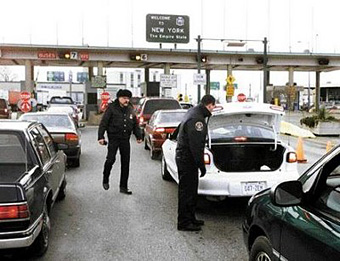
|
 |
 |
 News from Around the Americas | February 2008 News from Around the Americas | February 2008  
Traffic Normal Across US Borders With New ID Rule in Effect
 Jeff Bliss - Bloomberg Jeff Bliss - Bloomberg
go to original


| | Canada-US Border | | |
Traffic at the U.S. northern land border flowed normally as U.S. customs officers explained - yet didn't strictly enforce - President George W. Bush's new rule requiring proof of citizenship that went into effect today.

Customs and Border Protection officers passed out sheets detailing the need for either a passport or a driver's license and birth certificate to enter the country, said Kelly Klundt, a spokeswoman for the agency. Previously, U.S. and Canadian travelers could assert their citizenship without proof.

"It's sort of a soft rollout," said Bill Stenger, president of Jay Peak Resort Inc., a Jay, Vermont-based ski area that generates half of its $24 million in annual revenue from Canadian visitors. "When they start to tighten" enforcement, "that's when the oatmeal hits the fan."

Homeland Security Secretary Michael Chertoff said the new requirements are a common-sense solution to end vulnerability at the border. Advocacy groups for travel and entertainment companies say the rules may deter people already contending with shifting deadlines and other security demands for air, sea and land travel.

Most of the impact of the new policy is expected to be felt along the northern border because Mexican citizens already are required to show a passport and visa to gain entry.

Along both land borders, the only significant delay was reported at Tecate, California - 20 minutes longer than usual. Officials there blamed a power failure in an entry lane that was unrelated to the new requirement, Klundt said.

Chertoff told reporters in Washington that compliance was "high" at the northern border and "moderate" at the southern border.

Industry Warning

The U.S. economy will lose $675 million a year if just 5 percent fewer Canadians come to the U.S., according to the Washington-based Travel Industry Association.

Chertoff said not requiring documents to prove citizenship would be naοve and dangerous. "It's an honor system, and the reality is in this day and age, you can't have an honor system at the border," he said in a Jan. 25 interview with Bloomberg Television. Travelers made 31,060 false claims of U.S. citizenship at the land borders between 2005 and 2007, according to Homeland Security.

Border officers will have discretion in enforcing the rules while the department tries to publicize the changes.

Initially, Customs and Border Protection officers will hand out sheets with the new requirements, use discretion in detaining people for more detailed examinations and monitor the flow, Homeland Security officials said.

Publicity efforts begun last June, and travelers and border communities have been prepared for the new rules, they said.

GM, Ford Prepared

Spokeswomen for General Motors Corp. and Ford Motor Co., the world's first and third largest automakers, said the companies' Canadian parts suppliers are well aware of the papers they will need.

"We're confident our suppliers are prepared," said Janine Fruehan, a spokeswoman for Detroit-based GM. Delays may occur at the border because "someone else might not be prepared."

Yet business groups said the Bush administration's public- awareness campaign has fallen short. "They don't seem to be prepared for changes they make in policy," said Angelo Amador, director of immigration policy at the Washington-based U.S. Chamber of Commerce, the nation's largest business lobbyist.

Business leaders referred to the long lines and 12-week backlog in issuing passports last year caused by the Bush administration requiring that all U.S. citizens entering the country by air from Canada, Mexico and Caribbean nations have the documents.

Other Rules Delayed

The public backlash forced the U.S. to delay the broader requirements for entry by land and sea. In December, Bush signed legislation postponing until June 2009 the Western Hemisphere Travel Initiative, which would require at the borders more than a birth certificate: a passport, a special driver's license or a wallet-sized passport card certifying citizenship.

Senator Patrick Leahy, a Vermont Democrat, and Senator Ted Stevens, an Alaska Republican, said the administration needed the extra time to better prepare travelers for the changes.

Nineteen senators, including Leahy and Stevens, and a coalition of business groups earlier this week sent letters to Homeland Security officials requesting the new rules be delayed. Leahy believes the requirements may violate the December law and is considering legal action, said his spokeswoman, Erica Chabot.

Canadian Sales

Business groups said that, if past security initiatives are any measure, the new rules would hurt Canadian sales for U.S. companies that have been propelled by the weakening U.S. dollar.

Strengthened border security in the wake of the Sept. 11, 2001, attacks discouraged Canadian travel to the U.S., according to Statistics Canada, the country's data agency.

In the first nine months of 2007 - a period in which the Canadian dollar reached parity with the U.S. dollar - Canadians averaged 1.9 million same-day car trips per month to the U.S.

That's a decrease from the record 4.9 million trips monthly in 1991 during a similar surge in the Canadian dollar.

The needs of the struggling U.S. economy leave little room for confusion at the border, said Roger Dow, president of the Travel Industry Association.

The security measures "could harm ourselves phenomenally economically," he said. "We've got to get it right."

To contact the reporter on this story: Jeff Bliss in Washington jbliss(at)bloomberg.net | 
 | |
 |



